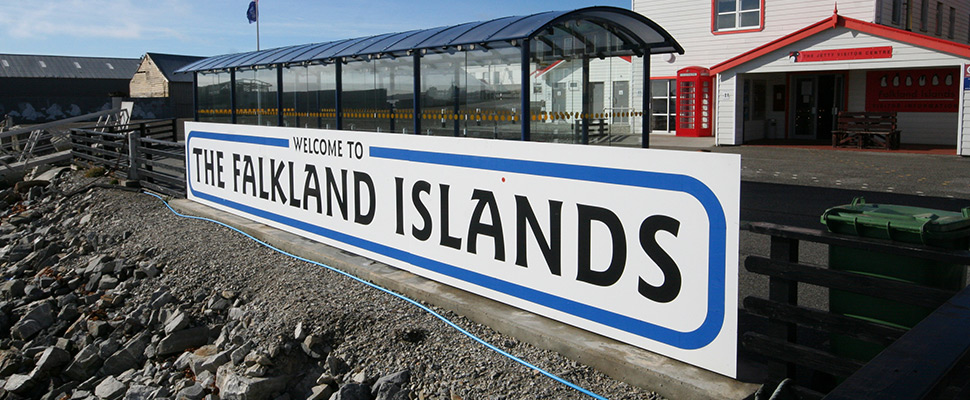Falklands Independance


The quote was mentioned in a piece written by a retired Argentine diplomat who has visited the Falkland Islands several times, but words actually belong to a Foreign Office official appointed to the British High Commission Office in Trinidad & Tobago.
Diplomat Jorge Lidio Viñuela wrote a column in the Argentine newspaper Los Andes, proposing the opening of an “Argentine House” in the Falklands since he is convinced that without active participation of the Islanders, –the real problem–, there is no chance for Argentina to advance in its sovereignty claim.
And to that respect Viñuela quotes Foreign office official, Susan Curtis who during an event in Port Spain at the Swiss embassy, in 2012, with at least sixteen fellow diplomats from different countries attending, she dared such brash statement.
But why such brash statement, asks Viñuela and displays two main arguments.
1) In effect that has been British colonial policy; for decades the British retained the sovereignty of its colonies to then grant independence as “a concession from her gracious Majesty”, keeping them in the British Commonwealth of 52 states. This is a kind of “commercial club of privileged friendship” whose members are all Anglophone. For example, the island of Santa Lucia, among others. A small island to the north of Venezuela, with a minimum territory that can easily fit 36 times in one of Argentina’s smallest provinces. It has an elected prime minister and a “governor” representing the Queen. Santa Lucia became a new independent nation some 38 years ago.
2) January 3rd of 2033, will be the 200th anniversary of the ‘invasion and occupation by the British crown of the Malvinas Islands’, a symbolic date very appropriate, according to some Falkland Islanders, to declare independence from the UK and become a new member of the international community.
Since October 1965 Argentina has been trying vainly to pressure the British to negotiate through the United Nations and other international organizations such as Unasur, OAS, Mercosur. And in 1982 it lost patience and committed the blunder of trying to solve the dispute by force. All these attempts have been absolutely inefficient and negative, and the best evidence of this is that the Islands today remain as a British colony. “It’s absurd to expect a different result if we always apply the same procedure”, Einstein use to say.
Several prestigious analysts of Argentine foreign policy such as Jorge Castro, Sergio Berenstein, Carlos Perez Llana and Rosendo Fraga commit the same typical and most serious Argentine error when they assess the Malvinas issue: they never mention the most important problem, the Islanders. What a majority or Argentines ignore is that since the 1982 war the British electorate overwhelmingly supports the Islanders and their “right to self determination”. This impedes the British Prime Minister, be it Conservative or Labor from having the least leeway space to negotiate sovereignty with the Argentines without the consensus from the Islanders. This in fact acts like a veto power to whatever is negotiated without their participation or approval.
Viñuela believes Argentina must establish some kind of amicable relation with the Islanders, which is nonexistent currently. Islanders particularly those over 50, have a deep mistrust and hostility towards anything from Argentina, he points out.
This means Argentina can’t follow on this track because after 52 years we are in the same or worse situation than in 1965, in what refers to Malvinas. Last 7 April, Los Andes published an article from Viñuela under the heading “An overcoming proposal”, which was written after having visited the Islands, spoken to Islanders, which convinced him of the need to change the strategy of Argentine aspirations.
And warns that if this is not done the Malvinas Islands will be recognized as an independent state by the 52 members of the British Commonwealth of Nations, at the latest on January 2033, that is only sixteen years from now.
As a concrete measure to counter this Viñuela proposes the opening of an “Argentine House” in Stanley, with the mission of getting closer to the Islanders, attempting a better mutual comprehension and above all confidence building. Most probably at the start the house would not have such name or exalt nationalism with Argentine symbols. That would only produce identical result to that experienced by Nobel Peace Prize, Adolfo Perez Esquivel, when the visited the Islands last April displaying publicly Argentine symbols: he only harvested hostility and absolute rejection. Viñuela admits he was an involuntary witness of such a situation.
The Argentine House would promote tourism, trade, cultural, education, sport activities but above all would facilitate relations between both sides. Most probably the more hostile and recalcitrant Islanders will not change their attitude, but with time, and years, they will become a minority, and step by step Argentina could collect a better attitude from the Islanders and vice versa. Viñuela is convinced that in ten, fifteen years there can be conditions to find a definitive solution.
The Argentine retired diplomat finalizes arguing that 52 years have gone by since the United Nations invited the UK and Argentina to advance with no delay negotiations to find a peaceful solution to the problem of the sovereignty dispute. Argentina should change the procedure and if so will modify results.
Viñuela says he delivered his written proposal last 28 April to ex minister Susana Malcorra, through ambassador Maria Teresa Kralikas, head of the Malvinas, Antarctica and South Atlantic Islands Under secretariat. Apparently he is still waiting for a reply.
Merco Press |





